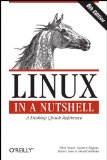 |
| | | | | | | | | | | | | | |
Glossary - Linux
![[Linux mascott: Tux]](linux.gif) Linux is an operating system that was initially created as a hobby by a young student, Linus Torvalds, at the University of Helsinki in Finland. Linus had an interest in Minix, a small UNIX system, and decided to develop a system that exceeded the Minix standards. He began his work in 1991 when he released version 0.02 and worked steadily until 1994 when he released version 1.0 of the Linux Kernel.
Linux is an operating system that was initially created as a hobby by a young student, Linus Torvalds, at the University of Helsinki in Finland. Linus had an interest in Minix, a small UNIX system, and decided to develop a system that exceeded the Minix standards. He began his work in 1991 when he released version 0.02 and worked steadily until 1994 when he released version 1.0 of the Linux Kernel.
The kernel, at the heart of all Linux systems, is developed and released under the GNU General Public License and its source code is freely available to everyone. Technical information about the Linux kernel can be found at the LinuxHQ web site at http://www.linuxhq.com/.
|
GNU/Linux
The kernel is an essential part of an operating system, but useless by itself; it can only function in the context of a complete operating system. ![[FSF mascott: Gnu]](gnu.gif) Linux is normally used in combination with the GNU operating system: the whole system is basically GNU with Linux added, or GNU/Linux. All the so-called "Linux" distributions are really distributions of GNU/Linux.
Linux is normally used in combination with the GNU operating system: the whole system is basically GNU with Linux added, or GNU/Linux. All the so-called "Linux" distributions are really distributions of GNU/Linux.
Aside from GNU, one other project has independently produced a free Unix-like operating system. This system is known as BSD, and it was developed at UC Berkeley. BSD systems today use some GNU programs, just as the GNU system and its variants use some BSD programs; however, taken as wholes, they are two different systems that evolved separately.
The two preceding paragraphs were assembled with content found on the GNU web site: http://www.gnu.org/gnu/linux-and-gnu.html
Pronounciation
There are two main schools of thought on pronouncing the name "Linux," and the debates have been known to become quite heated on occasion. The two main pronounciations are:
![[Her Royal Majesty: Queen Elizabeth]](/images/queen-elizabeth_s.jpg)
- Queen's English-proper rules: Lie-nucks
- Linus Torvald's native tongue: Linn-ooks
Although both arguments have their merits, our preference in English-speaking Canada is to follow the standard conventions of the English language since Linus Torvald's native language is generally comprised of a different set of pronounciation rules than that of English.
For folks who are familiar with Linus Torvald's native language, it certainly makes sense to use the native-tongue pronounciation. No matter which one you use, people will know that you mean Linux, so in essence you won't be wrong to use either one as long as you are aware of both styles which seem to be equally common.
[Home] [Profile] [Glossary] [Library] [Resources] [Tools] [FAQ] [Site map] [Contact us]
Copyright © 2004-2026 Inter-Corporate Computer & Network Services, Inc. All rights reserved.
All trademarks are the property of their respective owners.
